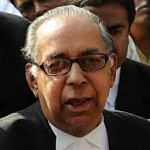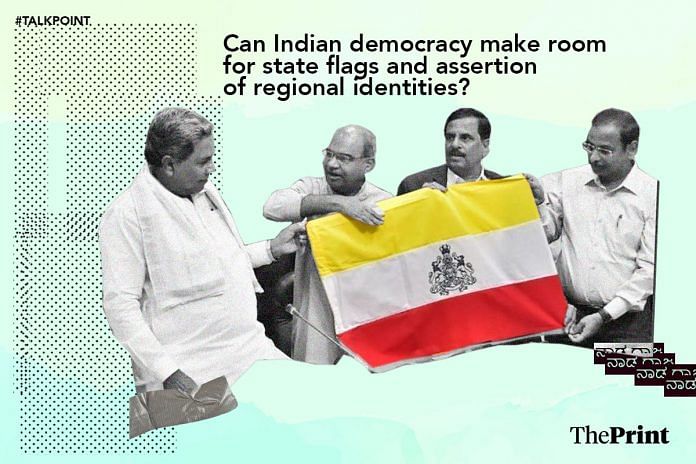Chief minister Siddaramaiah has unveiled a flag for the state of Karnataka called ‘Nada Dwaja’. If the move is ratified by the Centre, Karnataka will be the second state in India, after Jammu & Kashmir, to have its own official flag.
ThePrint asks: Can Indian democracy make room for state flags and assertion of regional identities?
The Karnataka flag is a reaffirmation that states are not just appendages of the centre
 Alok Prasanna Kumar
Alok Prasanna Kumar
Senior resident fellow at Vidhi Centre for Legal Policy
India’s constitutional democracy is based on celebrating, and not merely tolerating, diversity. We see this not just in the way the clauses concerning the fundamental right to equality are framed, but also in the specific protections offered to linguistic and religious minorities, the federal structure of the government, and the absence of any identity requirements for citizenship, among many other features. Key, in the context of the debate over Karnataka’s move to have an official flag, is the federal structure of the Constitution.
With India being a Union of states, federalism in the country is not just an administrative measure, a colonial hangover or a historical accident. It is an affirmation that there is no one set of policies and approaches to governance that can meet the needs of a vast and diverse land. States don’t just fall within administrative boundaries — they have been formed on the basis of linguistic and tribal identities after long struggles.
Unfortunately, we are living in a time when the federal nature of the polity is under a stealth attack. Whether in the form of the GST, which gives the Union a veto over state fiscal policy, or in the endless attempt to promote the bureaucratic, sanskritised Hindi at the expense of all other languages, there’s a sustained assault on not just the diversity of the nation, but also the federal structure itself.
The Karnataka flag is not just a symbolic pushback against this. It is also a re-affirmation of the constitutional value of diversity in identity and governance. It is a statement that the states are not just the appendages of the Centre, existing to merely implement policies framed in Delhi, but governments in their own right with the power to choose a different path.
The mere co-existence of Karnataka flag with a national flag shouldn’t threaten India’s unity
 Mathew Idiculla
Mathew Idiculla
Lawyer and researcher, Centre for Law and Policy Research, Bengaluru
The Constitution of India does not have any provision that either enables states to have their own flags, or restricts them from doing so. It is this constitutional ambiguity that has allowed the government of Karnataka to adopt an official state flag.
The timing of the decision suggests that it’s motivated by the upcoming assembly elections in Karnataka. CM Siddaramaiah has built an image of being a champion of the Kannada cause by supporting a state flag and opposing the imposition of Hindi. While such an assertion of subnational identity might be aimed at winning over the electorate, it is a legitimate political exercise.
The relevant question to consider is whether such a form of subnationalism threatens national integrity and privileges certain communities over the other. The Karnataka government has clearly stated that the state flag will always fly below the Tricolour. Hence, the mere co-existence of a state flag with a national flag shouldn’t threaten India’s unity. It also appears to be an inclusive symbol of Karnataka that does not discriminate between the various groups within the state.
As India is a vastly diverse country with a federal Constitution, the assertion of state identity through an official flag cannot be seen as antithetical to the national identity. India’s constitutional democracy has been flexible enough to accommodate the linguistic and cultural aspirations of different groups in creative ways. In fact, it is the recognition of subnational aspirations and identities that has allowed India to endure as a single nation.
Having a separate Karnataka flag does not make you any less patriotic
 Dinesh Gundurao
Dinesh Gundurao
Working president, Karnataka Pradesh Congress Committee
We can make room for the flag because this democracy has taken root over many years and democracy does not become insecure with a state expressing its own identity in a limited manner.
This does not threaten the nation at all. We have our own identity, our own language and culture, our own state anthem. Having a state flag does not make it an anti-national move. It is a completely wonky notion to even think like that. In fact, we must encourage our states to maybe express themselves even more; it will not harm our democracy, but make it more vibrant.
Everyone talks about their own language — Tamil Nadu, Andhra Pradesh, Kerala, West Bengal; they all assert their own identity by protecting their language and culture. And assertion through language is also a symbolic act. To brush it under the carpet saying we should not do it is unfair. The actual truth is that every state is asserting its identity. Having a separate language itself is an expression of identity.
Who said that having a state flag means the national flag is going to be disrespected, or we are not a part of India or don’t want to be part of India? We are tied to one another. We have people from all across the country living in each other’s states. We are an integral part of each others’ lives, but, at the same time, we want to preserve our own identity and that should not be perceived as a threat.
It is the Hindi speakers who may feel a bigger threat as there is a certain class that tries to impose Hindi and the Hindu culture on the rest of the country, which is unnecessary.
Other states may be inspired to have their own flag, but the national flag is always the national flag. We are proud of it and nothing can equal that. Let other states have heir own flag too. It does not make you any less patriotic.
Regional flags and symbols are inseparable aspect of Indianness
 Hilal Ahmed
Hilal Ahmed
Associate professor at CSDS
There are two possible ways to address this question.
In a strict legal-technical sense, one may look at the official status of the State symbols — national flag, national emblem, and national anthem — to find out the ‘official’ meaning of national identity. Laws and norms related to the Flag Code of India and judicial verdicts with regard to the national anthem are an important source for this kind of an explanation.
For instance, the Prevention of Insults to National Honour Act 1971 very clearly mentions the official sacredness of the Tricolour and the significance of the national anthem. The 2002 Flag Code and an advisory issued by the ministry of home affairs in 2017 can also be cited here. These laws are primarily concerned with the expected official commemorative function of national symbols; hence, the national identity expressed through these symbols cannot be interpreted as a denial or negation of regional or local identities.
There is another, more direct mode to engage with the question of regional assertions and symbols. The democratic principles enshrined in the Constitution’s Preamble conceptualise national identity as an amalgamation of various cultural, regional and linguistic identities. Article 1 of the Constitution defines India as a ‘Union of states’, while Article 2 further clarifies that the Union was always made of states and Union territories. This constitutional schema underlines the India-specific democratic principle — unity in diversity. From this point of view, the symbols of India actually represent as well as celebrate Indian diversity.
Therefore, regional flags and symbols are inseparable aspect of Indianness that do not contradict the symbols and emblems of the Republic.
No state should have a separate flag, it creates unnecessary complications
 B V Acharya
B V Acharya
Former advocate general and member of the Law Commission
The law permits only one flag for the whole nation. Do you know of any other state, except J&K, with a flag of its own? It is my opinion that no state should have a separate flag.
I strongly oppose it because it encourages regionalism.
Proponents of the idea in Karnataka say it is about Kannada pride. However, about the people in Kerala’s Kasaragod and other adjoining areas with significant Kannada-speaking populations? If Kerala also gets its own flag, which flag should the residents of Kasaragod respect? We Kannadigas will talk in Kannada as we can’t ignore our language, the same way Marathas cannot ignore Marathi.
My question is, where is the need for such a flag? It is totally unnecessary. It will create unnecessary complications and we should get our priorities right. Why now? Why was this not raised in the last 70 years?
What is the question of state pride? You must have national pride. Just because the Constitution does not oppose a state flag, it does not mean you can divide the country and each state can have a separate flag.
The Centre should straightaway reject the proposal and say no state should have a flag.
This is not a justiciable matter, and even if Karnataka moves court, it will not be entertained.
A Karnataka flag is a reminder that India is a quasi- federal nation at a time when BJP and its allies are in power in 22 states
 Apurva Vishwanath
Apurva Vishwanath
Journalist, ThePrint
Public events in Karnataka always begin with the singing pf the state anthem (written by the state poet), and the national anthem is played at the end. The red-and-yellow flag has represented the Kannada chaluvali — campaign to spread the language. The flag and the anthem have formed an expression of regional and linguistic pride.
Let’s get real — states were carved out on linguistic lines to keep Hindi nationalism in check. So there cannot be a restriction on the expression of state pride. Andhra Pradesh and Tamil Nadu also have state anthems. It is an exercise of free speech.
The day J&K’s PDP-BJP government was sworn in, an iconic image of Mehbooba Mufti seated behind two flags was symbolic of what was in store for the state. The Constitution explicitly allowing a separate flag for J&K does not translate into a prohibition for every other state. A state flag does not even violate the Prevention of Insults to National Honour Act.
But the issue here is not of legal sanction for having a state flag. The Karnataka government’s adoption of a state flag is simply a ploy to politically out-manoeuvre the BJP right before the polls. The departure from the red-yellow flag to imitate the Tricolour only shows that it is to pit regional pride against the BJP’s national assertion. It is a reminder that India is indeed a quasi-federal nation at a time when the BJP and its allies are in power in 22 states, creating a perception of disproportionate power being centred in Delhi.
Compiled by Deeksha Bhardwaj, Journalist at ThePrint.




Answered in the US (in which each of the 50 States has its own flag) and Canada (each Province has its own) — problem in India is that its States (from 15 States and 7 UTs in 1961 — now 29 States and 7 UTs) have been fissiparous unlike those of US and Canada!
India belongs to everyone equally is in theory. North India produce more kids and for their mistake Karnataka has to loose forest, create un heigenic society, increased crime rate. When Karanataka create environment to come in, Hindi states just produces kids builds bossism society. And neighbor state like andra, tamilnaadu did not implement land reform so they are able to build regional party and protect right whereas karnataka implemented land reform which weakened the landlord so karantaka failed to comeup with good regional party. Kerala, with left the made sure that not much development, so not much migration to their state.For gujarathis, who only bother money, will get advantage out of India. If at all who gave their resource by loosing their identity,culture are those marati and kannadigas. In this juncture, kannada flag is bringing kannadigas together to fight injustice. We cant get more punished for others mistake. If possible, Let GOI build more cities in northern part by taking land from farmers. Karantaka cant afford to loose more land. Karnataka want to send this message to other indian. Enoug of exploitation. Take responsibility, develop your states.
You have a point, but I guess the anger towards GOI and other states is not fair. Your GOI worked overtime to give the current bigger geography of Karnataka by incorporating regions from Nizam’s Hyderabad in new Karnataka. At the time of independence, there was hardly any Industry worth mentioning in Karnataka. Again, your GOI brought in central govt heavy industries to Bangalore – ITI, HMT, BEL, BHEL, BEML, HAL, NAL, ISRO etc generating millions of direct and indirect jobs. Rest of India didn’t complain. In other words the City Bangalore is seeded by your GOI. I am sure you love your India as you love your Karnataka, let not allow INC take advantage of a manufactured anger. This party of corpses, ignorant of its great traditions, is hell bend on ruling by dividing us. Jai Hind.
What is a flag ?
It is just a piece of cloth – but it is the people who give that piece of cloth meaning.
The real question is – why does Karnataka need a separate flag ?
The answer is that Karnataka finds itself in a place where it finds its identity being subsumed by the multi-cultural society Indai is becoming – with North Indians , Bengalis, Gujaratis, Telugus, Tamils etc all present in large numbers in Bengaluru creating a cosmopolitan hodge podge that the Kannadiga finds himself adrift and rootless.
This flag “theatrics” is a push back by the natives against the wave of the future – a multiccultural India where all Indians claim equal ownership to all parts of India – where Kargil or Kanyakumari belongs to all Indians equally.
This is what this flag is trying to assert itself against. This is what this piece of cloth represents – a resistance to this idea and this inevitability.
For most Indians – they need only one flag – the Tiranga. It is adequate for them. But for others, the tiranga frightens them for it represents assimilation with the other, sharing resources with the other and a shared destiny.
Good one! Though I feel it is a manufactured fear, kanadigas are one of most open hearted people in this country. INC is again working overtime with some stupid idea